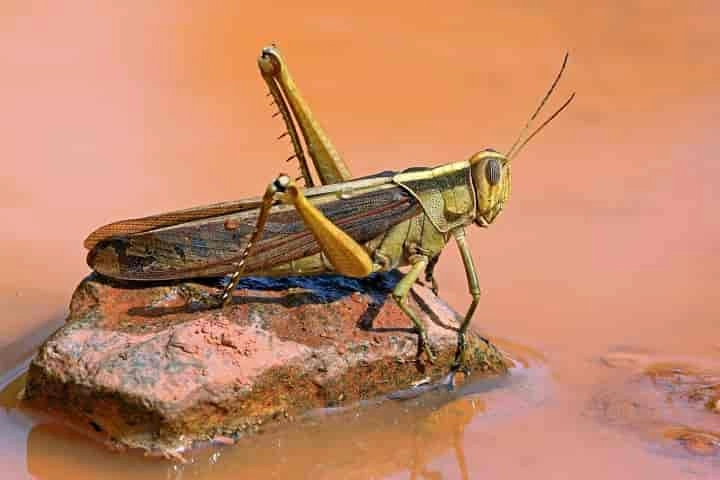

Garden locust found in Ghana. These insects which wreck havoc on crops can be very useful for early detection of cancer (Pics. Courtesy wikimedia commons)
<p>
<strong>Locusts have always been viewed by humankind as pests since ancient times as they damage crops and consume green vegetation. These short-horned grasshoppers who are mentioned by ancient Egyptians, and in epics like the Mahabharata and Iliad and in the Bible, have a beneficial aspect too.</strong></p>
<p>
Highlighting this, a report in sciencealert.com stated that scientists have shown that these insects are ace at diagnosing human cells which are healthy from cancerous ones by using their power of smell. This ability could greatly help in early spotting of the disease and thus greatly increase the chances of recovery.</p>
<p>
What is indeed extraordinary is the ability of the insects to identify the individual cancer cell lines and also hint at the type of cancer while also indicating the presence of cancer.</p>
<p>
<img alt="" src="https://www.indianarrative.com/upload/news/Locust_detail_from_a_hunt_mural_in_the_grave_chamber_Ancient_Egypt_wikimedia_commons.webp" style="width: 720px; height: 480px;" /></p>
<p>
<em>Locust detail found in the grave chamber of Ancient Egypt&nbsp;</em></p>
<p>
What is required is to work on this capability of locust in medical devices.</p>
<p>
Details of the study which have been published on pre-print website BioRxiv before it is reviewed by peers, have a lot of potential for early detection of the dread disease cancer.</p>
<p>
The recognition of cancer by locusts is found out when changes in their brain activity are identified by using electrodes. The detection is fast &ndash; taking place in a few milliseconds &ndash; and is reliable and sensitive.</p>
<p>
Commenting on this Christopher Contag who is a microbiologist at Michigan State University said: <a href="https://www.sciencealert.com/locusts-are-actually-great-at-sniffing-out-cancer-scientists-find?utm_source=ScienceAlert+-+Daily+Email+Updates&amp;utm_campaign=05d8405713-MAILCHIMP_EMAIL_CAMPAIGN&amp;utm_medium=email&amp;utm_term=0_fe5632fb09-05d8405713-366100389">&quot;Early detection [of cancer] is so important,</a> and we should use every possible tool to get there, whether it&#39;s engineered or provided to us by millions of years of natural selection. If we&#39;re successful, cancer will be a treatable disease.&quot;</p>
<p>
The detection of cancer is possible because volatile organic compounds which humans breathe out undergo a change due to cancer which hinders the individual cells&rsquo; metabolic processes. The insect which has superior olfactory skills can help in detecting this change.</p>
<p>
The brains of these insects are attached with electrodes and through them the response of the creature to the gas from varied cells is measured and signal profiles are set to typify the chemical they are smelling. The profiles for cells which are healthy differed from those of cancer cells.</p>
<p>
Previously it was known that appearance of mouth cancer cells was not the same as that of normal cells when looked under the microscope and this was attributed to change in metabolites. Now scientists have pointed out that VOCs are what made the locusts realise the difference.</p>
<p>
The present research was about mouth cancer yet the scientists are sure that other varieties of cancer can also be found out the same way due to the different signatures of the VOCs produced.</p>
<p>
Sharing details about the study, Contag said: &quot;We expected that the cancer cells would appear different than the normal cells. But when the bugs could distinguish three different cancers from each other, that was amazing.&rdquo;</p>
<p>
Early detection is a sure way of beating cancer as survival rate for stage 4 detection is 10 to 20 per cent while for stage 1 it is 80 to 90 per cent.</p>
<p>
Scientists are trying to develop a &lsquo;bionic nose&rsquo; that can identify the VOCs but are unable to create one that can equal what Nature has created and here the work on locusts could help.</p>
<p>
By understanding the working of the insect&rsquo;s brain, researchers want to use it for diagnosis of the disease.</p>
<p>
Commenting on this, Debajit Saha who is a biomedical engineer at Michigan State University said: &quot;Theoretically, you could breathe through a device, and it would be able to detect and differentiate multiple cancer types and even which stage the disease is in. However, such a device isn&#39;t yet close to being used in a clinical setting.&quot;</p>
Prime Minister Narendra Modi landed in Jeddah on Tuesday for a two-day State visit to…
Lauding the "deep connection" between the United States and India, US Vice President JD Vance…
Indian Minister of Power and Housing Affairs, Manohar Lal Khattar, visited the Arun-III Hydel Project,…
The body of the late Pope Francis will be transferred to St. Peter's Basilica on…
The case of Baloch human rights activist Dr Mahrang Baloch has been officially accepted for…
The World Uyghur Congress (WUC) has vehemently opposed the current social media spread of propaganda…